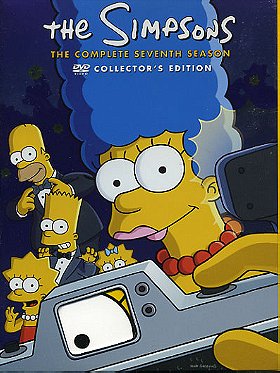One of the hallmark seasons of The Simpsons, season 7 features some of the strongest episodes produced during the show’s run. Considering that this is The Simpsons we’re talking about here, that’s saying a lot, but this collection deserves the accolades. Broadcast in 1995, season seven features several signature episodes, including Part II of "Who Shot Mr. Burns," "Bart Sells His Soul," and "Two Bad Neighbors" where former President George Herbert Walker Bush moves into the neighborhood (an episode gamely playing on the former President’s open dislike for the show). One of The Simpsons’s most definitive episodes, "Treehouse of Horror VI" famously broke the third wall by using the then-groundbreaking CGI technology to render Homer first in a 3-D world, then in real life, (despite the evolution in his form, he naturally ends up in an erotic cake shop). As the producers openly note on the commentary, it was a big deal at the time, and super expensive, which is why they could only do a few minutes of footage in CGI (some fans will particularly enjoy the revealing commentary on this one, as the producers explain the many visual puns and math jokes appearing in the background of the 3-D world). It’s a great example of how The Simpsons continued to play with its visual style and take creative risks years into its run. In fact, one of the best episodes on this collection, "The Simpsons 138th Episode Spectacular" proves just how far the look and style of the show really came during that time. Hosted by actor Troy McClure (voiced by the late comic great Phil Hartman), it presents never-before-seen outtakes and original footage from the show’s debut days on The Tracey Ullman Show, while taking a few self-referential digs at show creators Matt Groening, James Brooks, and Sam Simon. Other gems include "Homerpalooza" where Homer thanks guests The Smashing Pumpkins for their gloomy music because it has made his kids "stop wishing for a future I can’t possibly provide," and "Bart the Fink" where Bart inadvertently gets Krusty the Klown busted for tax "avoision."
Along with the 25 episodes there are extensive commentaries, featurettes, and deleted scenes all of which add immense value to the set and will give die-hard fans another excuse to spend more hours in front of the TV. It’s another benchmark collection from a show that, up to this point, doesn’t seem to know its own limits. --Dan Vancini
 1 comment
1 comment 1 comment
1 comment Login
Login











